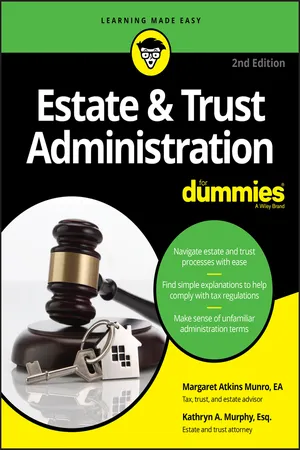
- English
- ePUB (mobile friendly)
- Available on iOS & Android
Estate & Trust Administration For Dummies
About this book
Estate and Trust Administration For Dummies, 2 nd Edition (9781119543879) was previously published as Estate and Trust Administration For Dummies, 2 nd Edition (9781118412251). While this version features a new Dummies cover and design, the content is the same as the prior release and should not be considered a new or updated product.
Your plain-English guide to administering an estate and/or trust
As more and more of the population reach senior ages—including baby boomers, many of whom do not have wills—an increasing number of people are being thrust into the role of executor, administrator, personal representative of an estate, or trustee of a trust after the death of a loved one. This updated edition of Estate & Trust Administration For Dummies guides you through the confusing process of administering an estate and/or trust.
Settling an estate and administering a trust can be complicated, messy, and time-consuming for individuals named as executor or trustee, most of whom have no previous experience with such matters. Estate & Trust Administration For Dummies shows you how to make sound decisions for your unique circumstances.
- Guides you through the confusing process of administering an estate and/or trust
- Provides expert advice on unfamiliar estate and trust tax law
- Gives you a practical checklist to follow for all of your estate and trust administration questions and concerns
Whether you're looking for guidance on how to navigate the probate process and estate taxes, settle debts and bequests, fund a trust, comply with tax regulations, or anything in between, this hands-on, friendly guide takes away the mystery and provides detailed answers to all of your estate and trust administration questions.
Frequently asked questions
- Essential is ideal for learners and professionals who enjoy exploring a wide range of subjects. Access the Essential Library with 800,000+ trusted titles and best-sellers across business, personal growth, and the humanities. Includes unlimited reading time and Standard Read Aloud voice.
- Complete: Perfect for advanced learners and researchers needing full, unrestricted access. Unlock 1.4M+ books across hundreds of subjects, including academic and specialized titles. The Complete Plan also includes advanced features like Premium Read Aloud and Research Assistant.
Please note we cannot support devices running on iOS 13 and Android 7 or earlier. Learn more about using the app.
Information
Getting Started with Estate and Trust Administration
Operating in a Fiduciary World



Identifying the Players
Determining an estate’s fiduciaries
- Executor: The executor is the person named in the will to “execute” the will — to carry out the wishes of the person making the will, including disposing of the property according to the will. A female executor is sometimes referred to as an executrix, although we don’t make that distinction in this book. A named executor may decline to act, although we hope this book gives you the confidence to embrace the role.
- Administrator: The administrator is a person appointed by the probate court to administer the decedent’s estate when the decedent left no valid will. A female administrator may be referred to as an administratrix.
- Personal representative: The personal representative is a general term for both the executor and the administrator. In some states, this term is used in place of executor or administrator.
- Guardian: A guardian is the person appointed by the probate court to take care of the person and the property of another person who is considered incapable of taking care of his or her own affairs because of his or her age (often a minor) or for other reasons such as mental disability, physical incapacity, or illness.
- Conservator: A conservator is similar to a guardian, but with less restrictive rules than those for a guardian. For example, the probate court may appoint a conservator for someone who can’t properly care for his or her property due to mental disability or physical incapacity, or for a person missing in action or a prisoner of war.A probate court rarely appoints a conservator for an estate, especially if you’ve already been appointed as executor or administrator; however, you may find yourself dealing with an already-appointed conservator of an estate beneficiary. Remember, just because you’re all working with the same set of assets doesn’t mean that you belong to the same team. As executor or administrator, you’re only responsible for the property owned by the decedent; a beneficiary’s conservator is responsible for that beneficiary’s interest.

Knowing who the trustees are
All by themselves: Independent trustees
All in the family: Family trustees
Table of contents
- Cover
- Table of Contents
- Introduction
- Part 1: Getting Started with Estate and Trust Administration
- Part 2: Administering an Estate
- Part 3: Operating a Revocable or Irrevocable Trust
- Part 4: Paying the Taxes
- Part 5: The Part of Tens
- Appendix A: Glossary
- Appendix B: State-by-State Rules of Intestacy and Estate or Inheritance Tax
- Index
- About the Authors
- Connect with Dummies
- End User License Agreement
